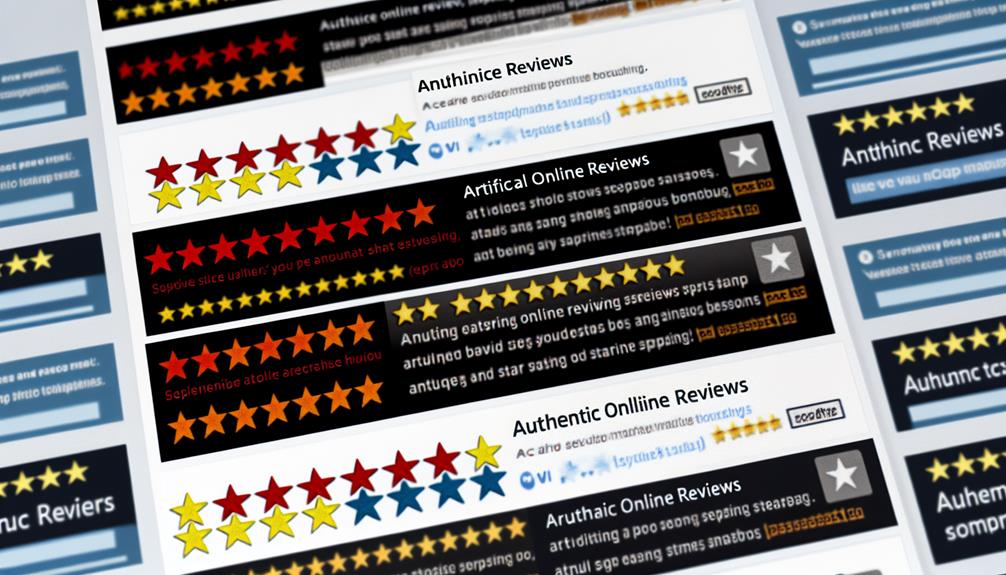In the digital age, online reviews play a crucial role in shaping consumer decisions. The prevalence of fake Google reviews raises concerns about the reliability of this feedback.
While the anonymity of the internet can make tracing fake reviews challenging, advancements in technology and data analysis have provided businesses with tools to identify suspicious patterns.
However, the question remains: Can fake Google reviews truly be traced back to their source? The answer involves a complex interplay of factors that go beyond mere detection techniques.
Key Takeaways
- Businesses employ tools and techniques like review aggregators and sentiment analysis to detect fake reviews.
- Analyzing review patterns using advanced technology helps identify inconsistencies and anomalies.
- Fake reviews can have legal consequences, leading to civil and criminal liabilities for perpetrators.
- Strategies like review moderation and fostering a customer-centric culture can combat the creation of fake reviews.
Importance of Authentic Reviews

Genuine customer feedback plays a pivotal role in shaping consumer decisions and fostering trust in businesses across various industries. The benefits and impact of authentic reviews are far-reaching, influencing not only individual purchasing choices but also the overall reputation and success of companies.
One of the key benefits of authentic reviews is their ability to provide valuable insights for potential customers. By reading about others' experiences with a product or service, consumers can make more informed decisions, leading to higher satisfaction levels and reduced post-purchase dissonance. Additionally, authentic reviews help create a sense of community among customers, fostering a feeling of belonging and trust in the brand.
The impact of authentic reviews goes beyond individual consumers and can significantly influence businesses' bottom lines. Positive reviews can boost sales and revenue by attracting new customers and retaining existing ones. On the other hand, negative reviews can serve as constructive feedback for businesses to improve their offerings and customer service, ultimately enhancing their reputation and competitiveness in the market.
Tools for Detecting Fake Reviews
Authentic customer feedback is crucial in shaping consumer decisions, and businesses employ various tools for detecting fake reviews to maintain the integrity of their online reputation. In the digital age, where online reviews heavily influence purchasing choices, the presence of fake reviews poses a significant threat to consumer trust. To combat this issue, businesses utilize sophisticated tools that analyze review patterns, sentiments, and other key indicators to distinguish genuine feedback from fraudulent ones.
One of the primary tools businesses use is a Review Aggregator, which compiles reviews from multiple sources to provide a comprehensive overview of customer opinions. These platforms help identify inconsistencies or anomalies in review patterns across different platforms, flagging potential fake reviews for further investigation.
Another crucial tool in detecting fake reviews is Sentiment Analysis software. This technology uses natural language processing to determine the sentiment behind a review, whether it is positive, negative, or neutral. By analyzing the language used and the overall tone of the review, businesses can pinpoint reviews that deviate from authentic customer feedback.
| Tools for Detecting Fake Reviews | Description | Benefits |
|---|---|---|
| Review Aggregator | Compiles reviews from various sources | Identifies inconsistencies in reviews |
| Sentiment Analysis | Analyzes the sentiment behind reviews | Determines the authenticity of feedback |
Analyzing Review Patterns

In scrutinizing online reviews, businesses leverage advanced analytical techniques to dissect patterns and trends within customer feedback data. Analyzing trends in reviews involves looking for recurring themes, sentiments, and keywords that may indicate the authenticity of the feedback. By employing natural language processing algorithms and sentiment analysis tools, businesses can gain valuable insights into customer opinions and experiences.
One key aspect of analyzing review patterns is spotting inconsistencies. Discrepancies in the language used, the timing of reviews, or the ratings given can raise red flags regarding the legitimacy of the feedback. Businesses often look for sudden spikes in positive or negative reviews, as these anomalies may suggest artificial manipulation rather than genuine customer feedback.
Moreover, businesses can use data visualization techniques to identify patterns visually. Heat maps, word clouds, and sentiment analysis charts can help businesses understand the overall sentiment of reviews at a glance. These visual aids make it easier to detect outliers and trends that require further investigation.
Legal Implications of Fake Reviews
Unveiling the intricate web of legal ramifications surrounding fake reviews necessitates a comprehensive examination of the regulatory landscape governing online consumer feedback. The legal consequences of fake reviews can be severe, encompassing both civil and criminal liabilities. From a civil standpoint, businesses affected by fake reviews can pursue defamation or libel claims against the perpetrators. These claims seek to restore the damaged reputation of the business and may result in financial compensation for the harm caused.
On the criminal front, fake reviews that involve fraudulent activities such as false advertising or deceptive practices may lead to legal action by regulatory bodies, potentially resulting in fines or even imprisonment for those involved.
Ethical considerations also play a significant role in understanding the legal implications of fake reviews. Fabricating reviews not only deceives consumers but also undermines the integrity of online platforms that rely on authentic feedback. Such actions erode trust in the digital marketplace and can harm both businesses and consumers. Therefore, beyond the legal consequences, there is a moral obligation to uphold transparency and honesty in online reviews to ensure a fair and trustworthy environment for all stakeholders.
In navigating the legal landscape of fake reviews, businesses and individuals must tread carefully, considering both the legal and ethical dimensions of their actions to avoid potential pitfalls.
Strategies to Combat Fake Reviews

To effectively combat the proliferation of fake reviews, businesses must implement proactive measures to safeguard their online reputation and credibility. In a digital landscape where consumer trust is paramount, strategies to combat fake reviews are essential for maintaining a positive brand image. Here are some effective tactics to tackle this issue:
- Review moderation: Regularly monitor and screen reviews to identify any suspicious patterns or language that may indicate a fake review. Establish clear guidelines for acceptable reviews and promptly remove any that violate these standards.
- Review verification: Implement mechanisms to verify the authenticity of reviews, such as requiring proof of purchase or sending follow-up emails to customers to confirm their experience. This can help weed out fake reviews from genuine ones.
- Encourage authentic feedback: Create a customer-centric culture that values genuine feedback and encourages customers to share their honest opinions. By fostering a transparent and open environment, businesses can deter the creation of fake reviews.
- Respond to reviews: Engage with both positive and negative reviews to show customers that their feedback is valued. Addressing concerns publicly demonstrates a commitment to customer satisfaction and can help mitigate the impact of fake reviews.
Frequently Asked Questions
Can Individuals Be Held Legally Responsible for Posting Fake Google Reviews?
Individuals can face legal consequences for posting fake Google reviews. This can result in defamation claims, penalties for deceptive practices, and potential lawsuits.
From a reputation management perspective, fake reviews can damage a business's credibility and trustworthiness, leading to loss of customers and revenue.
It is crucial to uphold ethical standards in online reviews to maintain a positive reputation and avoid legal repercussions.
How Common Is the Practice of Purchasing Fake Reviews on Platforms Like Fiverr?
Review manipulation through platforms like Fiverr has become increasingly common, impacting online credibility. The practice involves purchasing fake reviews to boost ratings and deceive consumers.
This unethical behavior not only distorts the reputation of businesses but also undermines trust in online platforms. As review manipulation proliferates, it is crucial for businesses and consumers to remain vigilant and prioritize authenticity in their interactions online.
Are There Any Ways for Businesses to Prevent Fake Reviews From Being Posted on Their Google Listing?
To prevent fake reviews on their Google listing, businesses can implement robust review moderation practices. By actively monitoring and flagging suspicious reviews, companies can maintain the credibility of their online reputation.
Additionally, businesses should be vigilant for competitor sabotage, where rivals may attempt to tarnish their image with fake negative reviews. By staying proactive and engaging with genuine customers, businesses can mitigate the impact of fake reviews on their online presence.
Is There a Specific Process for Reporting and Removing Fake Reviews on Google?
When addressing the process of reporting and removing fake reviews on Google, businesses can utilize the platform's reporting system to flag inappropriate content.
This action triggers an investigation by Google's team, which may lead to the removal of the fraudulent review.
It is crucial for businesses to actively monitor their online reputation and take swift action against fake reviews to maintain credibility and trust with their customers.
What Impact Can Fake Reviews Have on a Business's Online Reputation and Overall Success?
Fake reviews can severely damage a business's online reputation and overall success. They can mislead consumers, leading to a loss of trust and credibility. This unethical practice can harm not only the targeted business but also the entire online review system.
Businesses must prioritize authentic feedback to maintain consumer trust and uphold ethical standards in the digital marketplace. Addressing fake reviews is crucial for ensuring a fair and reliable online environment.
Conclusion
In the vast landscape of online reviews, the authenticity of feedback holds immense value. By utilizing tools to detect patterns and inconsistencies, businesses can uncover the true nature of reviews.
Legal implications surrounding fake reviews emphasize the importance of maintaining integrity in online reputation management. Implementing strategies to combat fake reviews is essential to uphold the credibility and trustworthiness of online platforms.
As shadows fade in the light of truth, genuine feedback emerges as a beacon of reliability.

